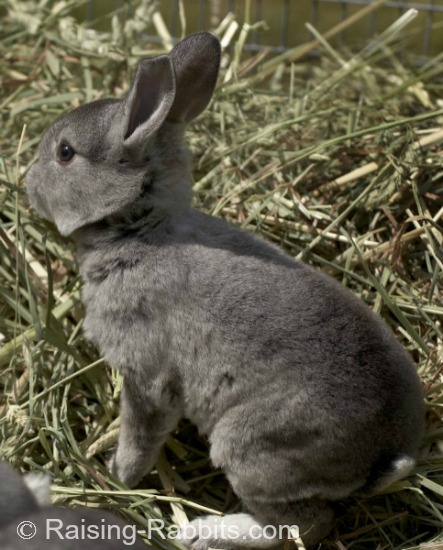| Back to Back Issues Page |
 |
|
Rabbit Rhythm #037 - Tips on meat rabbits, plus rabbit fear vs anxiety and more April 02, 2013 |
Rabbit Rhythms of AprilAre you raising rabbits as part of a homesteading enterprise? If so, this means that for you, spring is in full swing. Your does have been kindling, and your kits have been growing. The chances are good that you will have quite a few more litters as spring and summer progress. Your rabbitry will be producing rabbit meat (lapin) abundantly to feed your family and your pets. (If you have pet rabbits only, feel free to skip down to the Healthy Rabbits section, and stay tuned for next month's pet rabbit special edition...)
Our dogs and cats are another reason to raise rabbits. Cats are obligate carnivores, but both dogs and cats are likely to experience a bloom of health when switched to a raw, species-appropriate diet. For example, Mandy recently posted the following on our Raw Cat Food page: "I have recently changed the way I feed my cats onto a raw meat diet, after a long time of dealing with upset stomachs and the vet costing a fortune on tests only to be told it is down to diet. Having tried every commercial diet with no change, decided to change to raw as last resort. Why did I not do this before, the cats have recovered and are looking better than they have in a long time. Will feed raw meat from now on." Yep, sure ‘nuf! Here are some guidelines for marketing your rabbit fryers or for utilizing them for your own family's needs.
See Rabbit Farming for more tips on rabbit husbandry and additional ideas for utilizing both meat and pelts.
Healthy RabbitsFear vs Anxiety in Rabbits
(Pictured: This castor rex rabbit is crouched in the garden. His behavior indicates high alert for any predators that might threaten its life.) The rabbit’s greatest fear is not pain, it is anxiety and stress. Rabbits not only have smaller pain centers in the brain, but they also may experience some sort of a short circuit in the brain while being preyed upon that eliminates most or all of the pain. On the other hand, the sight or sounds of a nearby predator sends a rabbit’s anxiety levels through the roof. In order to protect themselves from anxiety, they are timid and cautious by nature. Knowing that a rabbit fears fear more than pain:
Read more: Rabbit Facts
News at Raising-Rabbits.comThe movie "Rabbit Fever" is now available on Amazon.com."5 teenagers. 25,000 rabbits. One extraordinary competition. Who will win the national title of Rabbit King & Queen?" This remarkable story can be rented or purchased via this link:
Like this newsletter?Maybe your friends would too...
Your friends at Raising-Rabbits.com wish you a wonderful April 2013. Enjoy your rabbits!
|
| Back to Back Issues Page |
 Humans are obligate
omnivores, meaning we require both plant- and animal-based nutrition for optimal health. For example, there are no plant sources of Vitamin B-12. None. Any humans who eliminate animals and animal products such as cheese from their diet must eat vitamin supplements to stay healthy.
Humans are obligate
omnivores, meaning we require both plant- and animal-based nutrition for optimal health. For example, there are no plant sources of Vitamin B-12. None. Any humans who eliminate animals and animal products such as cheese from their diet must eat vitamin supplements to stay healthy.
 Understanding the realities of life for rabbits in the wild will definitely help you better take care of your own domestic rabbits.
Understanding the realities of life for rabbits in the wild will definitely help you better take care of your own domestic rabbits.